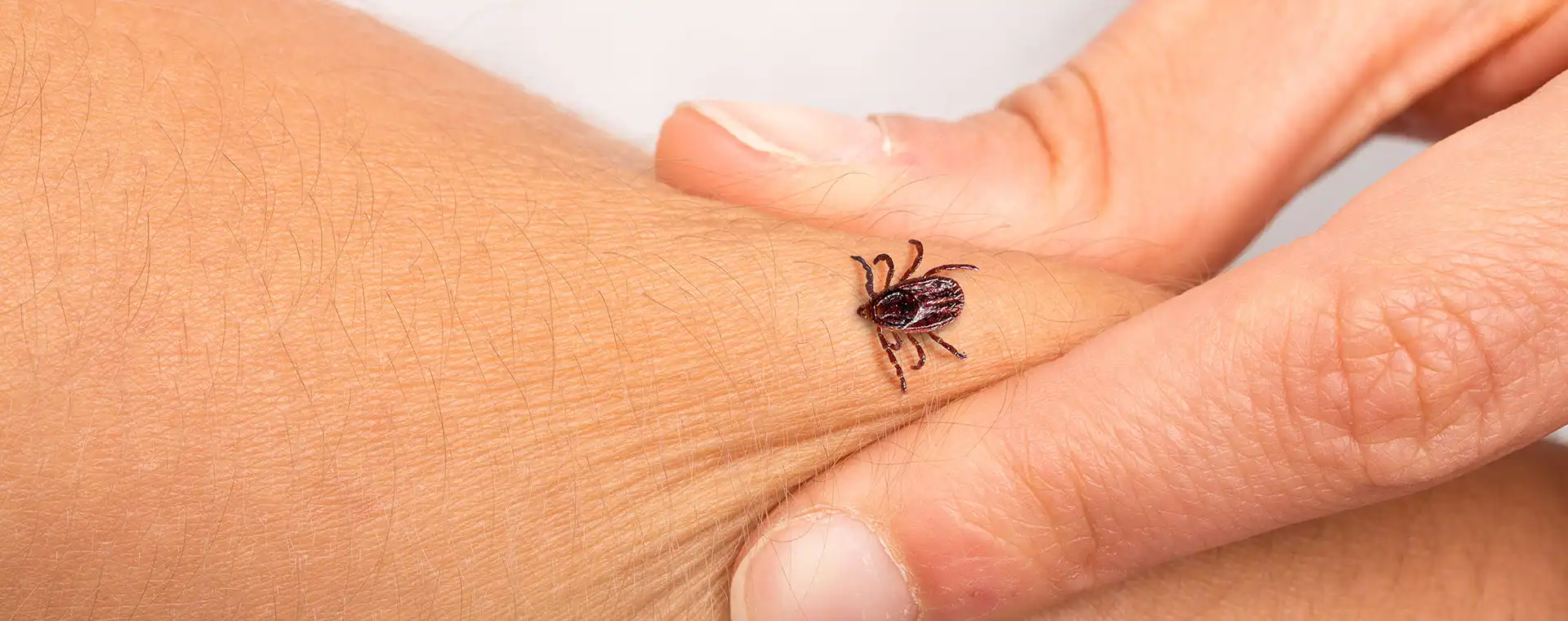As a Buffalo Metro area resident, you know ticks are a huge nuisance in this region.
Luckily, Buffalo Exterminators offers exceptional tick control services for homes and businesses across the Buffalo Metro area. As a locally owned company serving Erie and Niagara Counties for over 15 years, we understand the tick troubles unique to this region.
Our customized solutions will rid your property of ticks and keep them from coming back.
Why Choose Buffalo Exterminators for Tick Control
- Superior Skill and Know-How: Our tick extermination experts know these pests inside and out. We stay on top of the latest control methods and treatments to eliminate ticks effectively.
- Tailored Solutions: No two properties or tick situations are alike. We’ll evaluate your yard and homesite and design a customized plan to get rid of ticks on your specific property.
- Kid and Pet-Friendly Options: We use the latest natural, non-toxic treatments that are completely safe for children and pets when applied correctly.
- Guaranteed Results: We stand behind our tick treatments 100%. If ticks aren’t gone within 30 days, we’ll come back and treat again for free.
- Seamless Service: As a local company, we’re nimble and responsive. We know the Buffalo Metro area and can schedule service at your convenience without long wait times.
- No Contracts or Hidden Fees: We believe tick control should fit your budget. There are no contracts required and we’re upfront about all pricing.
- Dedicated Technicians: Our techs are tick experts, not random subcontractors. You’ll work with the same knowledgeable professional from start to finish.
Don’t let ticks take over your outdoor fun! Buffalo Exterminators’ treatments eliminate current infestations and provide long term protection through deterrence and prevention.
Why Ticks Can Be Dangerous Pests
While that “tickle” feeling of a tick crawling on you is unpleasant enough, these pests can cause more severe problems by:
- Spreading Disease: Ticks transmit bacterial infections like Lyme disease, anaplasmosis, ehrlichiosis, Rocky Mountain spotted fever and babesiosis. Getting bitten even once poses health dangers.
- Infesting Your Property: An established tick colony means you’ll constantly be picking them up in your yard. Infestations spread quickly to pets, inside the home and to family members.
- Ruining Enjoyment of Your Property: You should be able to relax in your yard and garden without worrying about ticks. They keep you from comfortably using your outdoor living space.
- Causing Allergic Reactions: Some people experience severe allergic reactions to tick bites, resulting in dangerous anaphylaxis, skin rashes, and breathing issues.
Don’t let pests disrupt your life. Take the first step towards a pest-free home.
Ditch Ticks, Enjoy the Buffalo Metro area’s Great Outdoors Again!
Hiking trails. Backyards. Playgrounds. Every corner of the Buffalo Metro area offers so much for outdoor lovers to explore. But nothing ruins a great day outside faster than getting home to discover ticks on you, your kids, or pets.
Ticks lurk in grass, shrubs, and wood piles waiting to hitch a ride on a passing person or animal. Once indoors, ticks can spread rapidly, hiding in carpets, bedding, furniture, and clothing.
Left unchecked, ticks do more than just creep you out. They can spread dangerous diseases, like Lyme disease, Rocky Mountain spotted fever, and ehrlichiosis. Ticks can also cause frustrating symptoms and costly medical bills for pets and humans bitten.
Protect what matters most with customized tick control from Buffalo Exterminators. Our treatments eliminate these disease-carrying pests where they live, breed, and hide
The Buffalo Exterminator Advantage: Customized Expertise for WNY Tick Problems
For ticks, one size control doesn’t fit all.
The strategies needed for a standalone house on acreage differ from those for a suburban home or city apartment. An infestation picked up at grandma’s cottage requires a different approach than lone star ticks plaguing your property year-round.
Buffalo Exterminators custom tailors a strategic tick management plan unique to your situation.
Here’s what you can expect:
Step 1: Thorough Inspection
We scour your property to discover all current or potential tick trouble spots. We’ll walk your entire property with you, inspecting your lawn, gardens, woods line and home exterior.
Step 2: Tick ID
Identifying the species allows us to select the optimal treatment methods.We’ll pinpoint problem spots in your property and the extent of the infestation.
Step 3: Targeted Treatment
We zero in on infested areas inside and out and treat aggressively. Our tech returns on the scheduled date to treat your property. We apply natural tick control products designed to kill and repel the pests.
Step 4: Follow-Up
Afterwards, we’ll follow up to ensure ticks are eliminated. Ongoing treatments can prevent future infestations. We’ll suggest proactive measures to keep ticks away long-term.
Our strategic process hits ticks where they live and breed while preventing new ones from invading your space. No tick stands a chance against Buffalo Exterminators’ customized games plans.
Tick-Free Family Fun Awaits with Buffalo Exterminators
Reclaim your yard. Feel at ease letting kids play outside again. Walk your dog without finding ticks every time. Entertain outdoors knowing your guests won’t get uninvited tick passengers.
No more finding ticks crawling through your home and hiding in shoes, clothing, and furniture. We’ll eradicate them at the source outside and in. Just check out our glowing 5-star reviews if you need convincing. We even offer a 100% satisfaction guarantee to tick-free your property.
Call (716) 800-2847 now to schedule a free quote. Our tick control experts are here to serve you. Contact us today to request fast, effective relief from persistent tick problems.
Reclaim your space from pests. Our experts are ready to help.

